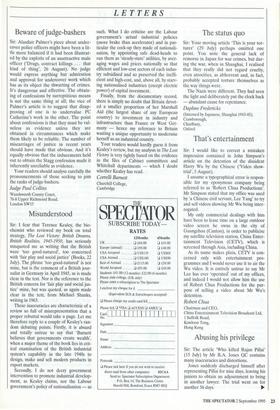Misunderstood
Sir: I fear that Terence Kealey, the bio- chemist who reviewed my book on total strategy, The Lost Victory: British Dreams, British Realities, 1945-1950, has seriously misquoted me as writing that the British were 'too good-natured', too concerned with 'fair play and social justice' (Books, 22 July). The phrase `too good-natured' is not mine, but is the comment of a British jour- nalist in Germany in April 1945, as is made clear in the text. Nor is the reference to the British concern for 'fair play and social jus- tice' mine, but was quoted, as again made clear in the text, from Michael Shanks, writing in 1963.
These inaccuracies are characteristic of a review so full of misrepresentation that a proper rebuttal would take a page. Let me therefore reply to a couple of Kealey's ran- dom debating points. Firstly, it is absurd and totally untrue to say that 'Barnett believes that governments create wealth', when a major theme of the book lies in crit- ical examination of the British industrial system's capability in the late 1940s to design, make and sell modern products in export markets.
Secondly, I do not decry government intervention to promote industrial develop- ment, as Kealey claims, nor the Labour government's policy of nationalisation — as such. What I do criticise are the Labour government's actual industrial policies (more brake than accelerator) and in par- ticular the cock-up they made of nationali- sation, by appointing safe dead-heads to run them as 'steady-state' utilities, by aver- aging wages and prices nationally so that efficient and low-cost sectors of each indus- try subsidised and so preserved the ineffi- cient and high-cost, and, above all, by starv- ing nationalised industries (except electric power) of capital investment.
Finally, from the documentary record, there is simply no doubt that Britain devot- ed a smaller proportion of her Marshall Aid (the largest share of any European country) to investment in industry and infrastructure than France or West Ger- many — hence my reference to Britain wasting a unique opportunity to modernise herself as an industrial country.
Your readers would hardly guess it from Kealey's review, but my analysis in The Lost Victory is very tightly based on the evidence in the files of Cabinet committees and Whitehall departments — which I doubt whether Kealey has read.
Correlli Barnett
Churchill College, Cambridge


















































 Previous page
Previous page